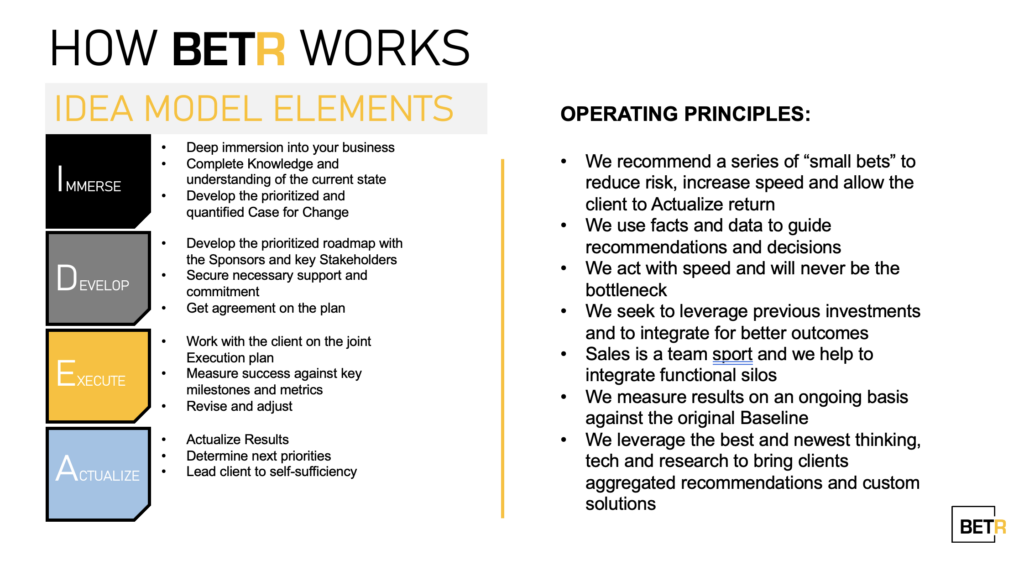THE METHODOLOGY MYTH

Unraveling the True Essence of Sales Strategies
In the vast expanse of sales literature and training programs, the term “methodology” is often used with a liberality that borders on the misleading. When we peel back the layers of what is commonly presented as a sales methodology, we frequently find not a structured method but a collection of research-backed ideas or a series of probing questions. This revelation brings us to an important juncture in understanding and applying sales strategies effectively—a point I like to call “The Methodology Myth.”
The Myth Unpacked
The essence of a methodology lies in its systematic nature, offering a step-by-step process designed to achieve specific outcomes. However, what many sales strategies tout as methodologies are often more accurately described as frameworks or philosophies. They provide guiding principles or insightful questions rather than a concrete, replicable process. While there is undeniable value in these insights, the distinction is crucial for sales professionals seeking actionable paths to success.
The Impact of the Myth
The mislabeling of sales strategies as methodologies can lead to unrealistic expectations. Sales teams might anticipate a clear roadmap, only to find themselves navigating a more abstract landscape of concepts. This discrepancy can breed frustration, particularly among those craving more directive guidance. Moreover, it challenges sales leaders to bridge the gap between high-level ideas and day-to-day sales activities, making the translation of these concepts into actionable strategies a critical yet daunting task.
The Power of Frameworks and Philosophies
Despite the critique, the value of sales philosophies and frameworks should not be understated. They cultivate a mindset conducive to adaptive, insightful selling. Take, for instance, the Challenger Sale. It’s based on a robust body of research and presents compelling insights into the behaviors that distinguish top-performing salespeople. Yet, its application demands interpretation, creativity, and adaptation to specific selling contexts—qualities that are hallmark strengths of a philosophy rather than a strict methodology.
Frameworks like these encourage sales professionals to think deeply about their approach, pushing them to understand their customers’ needs and industries more profoundly. They foster a consultative style of selling, which is invaluable in today’s complex sales environments. However, recognizing them for what they are—guides rather than gospel—enables sales teams to use them more effectively and adaptively.
Bridging the Gap
The challenge for sales organizations is to bridge the gap between the strategic orientation provided by these sales philosophies and the tactical execution required in the field. This requires a few key strategies:
1.Customization: Tailoring the principles to fit the unique aspects of your market, product, and sales cycle. This might involve developing specific questions that align with your value proposition or creating scenarios that mirror typical customer challenges.
2.Integration: Embedding the insights from these philosophies into the sales process, from prospecting to closing. This could mean integrating specific behaviors into sales training and coaching, ensuring they become part of the sales culture.
3.Practical Application: Developing practical exercises and tools that help sales teams apply these insights. Role-playing scenarios, case studies, and customer journey mapping are just a few examples that can make abstract concepts tangible.
4.Continuous Learning: Recognizing that the sales environment is ever-evolving and that continuous learning and adaptation are necessary. This means regularly revisiting and refining how these frameworks are applied in light of new challenges and opportunities.
Conclusion
The myth of the sales methodology does not diminish the value of the insights many of these philosophies offer. Instead, it invites a more nuanced understanding and application of these ideas. By acknowledging the difference between a method and a framework, sales leaders can set realistic expectations, better prepare their teams, and foster a culture of adaptability and growth.
The truth is, the art and science of sales cannot be boiled down to a simple checklist or formula. It thrives on the dynamic interplay between strategic insight and tactical execution, between the philosophy behind the sale and the methodology of its application. Breaking free from the methodology myth allows sales teams to leverage the full power of these insights, transforming sales strategies from myth to mastery.
In the end, perhaps the real methodology lies in our ability to navigate this complex landscape, applying research-backed ideas with the wisdom and flexibility that only experience can bring. This is the path to transcending the methodology myth and achieving true sales excellence.


